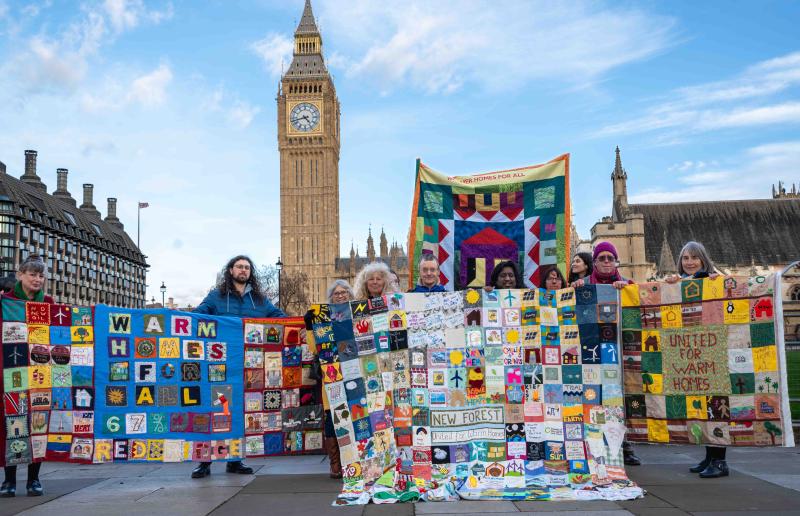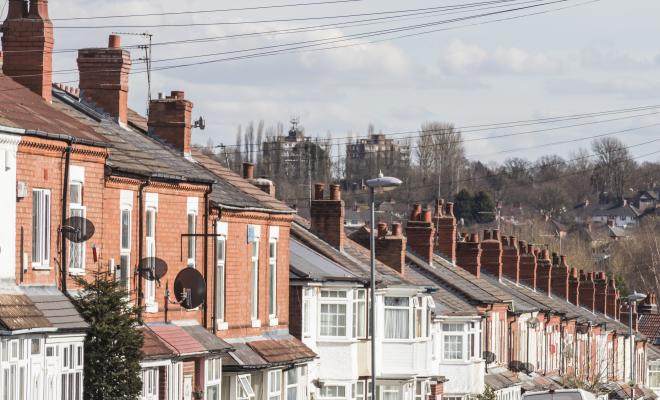16 Jan 2024
Ahead of the next general election, we need to secure active and vocal support for warm homes from current MPs and prospective parliamentary candidates (PPCs). This’ll ensure those elected commit to urgently fixing our energy system so that it works for people and planet. We’ll tell decision makers that they must show ambition and commit to our campaign asks if they're to win the next election. Find out more about our political strategy.
Resources for winning political commitments
Ask decision makers to sign our Warm Homes pledge
Current and future MPs can show their support and commitment by signing our United for Warm Homes pledge.
The more politicians that sign, the stronger our chances of succeeding in our campaign. The pledge also allows us to hold our decision makers to account after the election and ensure they follow through on their commitments. Adapt this template email to invite your MP(s) and electoral candidates to sign the pledge.
Once an MP or candidate signs the pledge, their name will be displayed on the pledge page. Seeing other MPs and candidates listed will be a compelling motivator for those who haven’t yet signed the pledge. So, if your group covers more than one constituency, you can use the fact that one MP or candidate has signed to leverage others in the area.
When MPs and candidates sign the pledge, ask them to share their support on social media using these template assets and post.
Some MPs and candidates might sign the pledge straight away, but some may need more persuading. Don’t be disheartened if they say no the first time you ask. One of the best ways to win support is to meet with them in person or online. This’ll allow you to build a stronger relationship with them and demonstrate the broad and diverse support for warm homes in your community. Take a look at our meetings guide to help you prepare.
You don’t have to invite every candidate standing in your area to meet, as that could become unmanageable. However, you should ensure you invite representatives from all parties that currently hold seats in Westminster. So that would be Conservative, Labour, Liberal Democrat and Green party candidates in England, plus Plaid Cymru in Wales.
Below are some more ways you can build pressure and persuade them to sign the pledge.
Tactics for winning political commitments
If your group is short on time, feel free to pick just one of these tactics to focus on. Make the most of these activities by having a mailing list sign-up sheet available whenever you're out in your community.
Send postcards
It’s important that our decision makers hear heartfelt messages from members of the community about why we need warm homes. We’ve created template postcards in the shape of a home which you can order and use to gather messages to send to current and prospective MPs. Find out more about how to create and send postcards.
Highlight the health impacts of cold homes
No matter who you are, if you live in a cold home, your health and wellbeing are at risk. Friends of the Earth has worked with the Institute of Health Equity to produce "Left out in the cold: the hidden health costs of Britain’s cold homes," which is a report on the health impacts of living in cold homes.
The research has found that 9.6 million UK households are living in heat-leaking, badly insulated homes and have incomes below the minimum required for an acceptable standard of living. Cold homes double the risk of adults developing new mental health conditions and put 1 in 4 children at risk of multiple mental health symptoms. Read more about the report and its findings on the Friends of the Earth website.
This research makes clear that urgent action is needed. You can use it to persuade your MPs and electoral candidates on the need for insulation. Here's how:
- Plan an action for 9 March 2024 (or the closest date to this that you're available) to bring the message to your MP's office and hand in the report to them. Read our guidance to help plan your photo action.
- Request a meeting with your MP to discuss the report findings and ask them how they'll take action. Use our template email to request a meeting. Don’t forget to take a look at our MP meeting guide to help you prepare once you’ve got a meeting confirmed. We’ve also prepared these talking points about the report to help keep the conversation with your MP on track.
- Share the report findings on social media using Friends of the Earth's handy share function to help make your MP, electoral candidates and local community aware of them.
Together, we can make sure that MPs and candidates listen and take action to bring down bills, keep homes warmer, improve health and slash emissions.
Send a joint open letter
A joint open letter is a great opportunity to build on existing community partnerships, to re-ignite partnerships where there hasn’t been a joint activity for a while, and to reach out to new partners. Create your own open letter for your group, local partners and members of the community to sign, calling on your MP(s) and candidates to sign the Warm Homes pledge.
We recommend setting your letter up on Action Network, a digital campaign platform to support your local campaigning. Get in touch with us and we can help you get your Action Network letter set up. You'll need at least one local partner on board before setting your letter up so that it can be signed by both your group and theirs.
The template letter includes an editable section where you should add some information about how your local community is being impacted by the energy crisis. It's important to give your letter a local angle so that MPs and election candidates will take notice.
The open letter highlights some key findings from the "Left out in the cold" report, focusing on health inequalities and cold homes. Working with partner organisations that support people disproportionately impacted by fuel poverty is central to the campaign and a key part of this action. Reach out to organisations that might be interested in the report, for example disability activist groups campaigning on the cost-of-living crisis or health groups campaigning against health inequalities. You should also share the open letter with your mailing list to encourage supporters to sign it. It's vital that MPs and candidates hear this message loud and clear, so the more people who've signed your open letter the better.
Once you’ve got enough signatures, send the letter to your MP and electoral candidates. You should also spread the word by sharing it on social media, tagging your MP and candidates, and by sending it to the local press to publish. Find out more about getting local media coverage.
As we get closer to the general election and more MPs and candidates have signed our pledge, we’ll turn our attention to running election-focused activities and events such as panel discussions with candidates (hustings).
Next steps after signing the pledge
Once your MP(s) or candidates have signed the pledge, it’s important to keep building the relationship with them. Ask them to become an active champion for the issue in your constituency. Remember, the more they speak about the issue publicly, the more they can be held to account if elected. Encourage your local politicians to:
- Post their support for the campaign on their social media channels. This includes sharing the pledge using the social media assets we’ve created.
- Visit a street that needs insulation and talk to residents, either door to door or via a meeting. Make sure the media are invited to interview them. Find energy crisis hotspots near you.
- Speak at an event you’re organising. Ask them to commit publicly to the campaign demands and outline how they’ll raise the issue with the rest of their party.
- Raise the issue within their party, for example with appropriate spokespeople or manifesto writers.
- Raise the issue within parliament by submitting written or oral questions, meeting with influential decision makers, joining all-party parliamentary groups, hosting parliamentary events or sponsoring debates.
- Meet with your group every few months to discuss how you can continue to work together on warm homes.
Reminder: the best way to convince decision makers is to show the breadth and depth of support for the campaign from voters in their constituency. So, before jumping to meet with them straight away, make sure to spend time building strong local support.
Engage your local political parties
Most constituencies will have an active Conservative, Green, Labour, Liberal Democrat or Plaid Cymru local party. These can help increase support locally and advocate for the campaign demands within their national parties.
Ideally your group should seek to gain support from the local chapters of all the major political parties.
To engage your local political parties, you could:
- Offer to do a presentation at their next meeting. Many local parties allow external presentations, especially on topics of relevance to the constituency.
- Ask them to put forward a warm homes motion and/ or adopt the demands of the campaign as local party objectives.
- Ask the local party to send a letter to their local MP, regional party and national policy team encouraging them to adopt our demands.
- Ask the local party to put pressure on their local MP to advocate publicly for warm homes.
- Invite them, alongside other local parties, to actions or events you organise.
If you need any guidance on or support with engaging your politicians, please don’t hesitate to get in touch with your regional campaign organiser or email [email protected]

